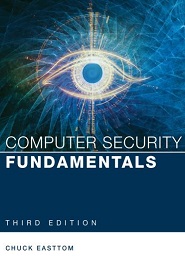
English | 2016 | ISBN: 978-0-7897-5746-3 | 448 Pages | PDF, EPUB | 18 MB
ONE-VOLUME INTRODUCTION TO COMPUTER SECURITY
Clearly explains core concepts, terminology, challenges, technologies, and skills
Covers today’s latest attacks and countermeasures
The perfect beginner’s guide for anyone interested in a computer security career
Chuck Easttom brings together complete coverage of all basic concepts, terminology, and issues, along with all the skills you need to get started.
Drawing on 20+ years of experience as a security instructor, consultant, and researcher, Easttom helps you take a proactive, realistic approach to assessing threats and implementing countermeasures. Writing clearly and simply, he addresses crucial issues that many introductory security books ignore, while addressing the realities of a world where billions of new devices are Internet-connected.
This guide covers web attacks, hacking, spyware, network defense, security appliances, VPNs, password use, and much more. Its many tips and examples reflect new industry trends and the state-of-the-art in both attacks and defense. Exercises, projects, and review questions in every chapter help you deepen your understanding and apply all you’ve learned.
Whether you’re a student, a professional, or a manager, this guide will help you protect your assets—and expand your career options.
Learn how to
- Identify and prioritize potential threats to your network
- Use basic networking knowledge to improve security
- Get inside the minds of hackers, so you can deter their attacks
- Implement a proven layered approach to network security
- Resist modern social engineering attacks
- Defend against today’s most common Denial of Service (DoS) attacks
- Halt viruses, spyware, worms, Trojans, and other malware
- Prevent problems arising from malfeasance or ignorance
- Choose the best encryption methods for your organization
- Compare security technologies, including the latest security appliances
- Implement security policies that will work in your environment
- Scan your network for vulnerabilities
- Evaluate potential security consultants
- Master basic computer forensics and know what to do if you’re attacked
- Learn how cyberterrorism and information warfare are evolving
Resolve the captcha to access the links!